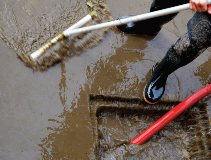Insurance for dentists
When it comes to insurance, we don't want you to simply go with the flow. Which is why at Guild, we're constantly evolving to reflect the real-life needs of dentists like you.
Join Guild Insurance today and choose to be protected by an insurer that's worked hand in hand with ADA NSW, ADA SA, ADAVB and ADATAS for over 25 years.

Professional indemnity and liability
Protects you for what you do as a dentist.

Business
insurance
Protects your dental practice and items in it.
Professional indemnity insurance covers you for your civil liability when a claim arises from a breach of your professional duty. For many professional policies at Guild Insurance combine professional indemnity, public liability, and product liability to cover more of your professional duties. Business insurance, on the other hand, is a broader category that encompasses various types of coverage designed to protect businesses from a wide range of risks. This can include property damage, theft, and liability claims from third parties.
For professionals providing advice or services:
- Assess your service risk: Evaluate the potential risks associated with your professional advice or services. Consider the possibility and implications of your advice or actions leading to a client's physical, psychological, or financial detriment. Reflect on the likelihood and consequences of a situation where an error or omission on your part could lead to legal action.
- Understand legal requirements: Familiarise yourself with the legal and regulatory landscape relevant to your profession. Is holding professional indemnity insurance a legal requirement or an industry standard in your field?
For certain contract positions and many allied health professionals regulated under Ahpra require professional indemnity and/or public liability insurance. - Consider your financial exposure: If faced with a legal claim, could you afford the legal defence and potential damages out of pocket?
For business owners protecting their operations:
- Identify your business assets: Determine which physical assets are crucial to your business operations, such as property, equipment, and inventory. Consider the consequences if these assets were damaged, stolen or lost.
- Evaluate liability risks: How likely is it that someone could be injured or their property damaged because of your business activities? This includes both public liability and product liability.
- Consider business interruptions: Think about the resilience of your business in the face of unforeseen events that might force temporary closure. How would such interruptions impact your financial stability?
If you are unsure of the cover you require, please contact us on 1800 810 213 to speak to an insurance specialist.

Key Product Features
Discover the limits and coverage built in to every Guild dentist liabilities policy.
Renewal FAQs
See the latest frequently asked questions and information for renewals in 2025.
Association Endorsed
Find out more about our long standing partnership with several branches of the ADA.
Hear from other dentists
01/03/2025
Jane P. at Guild is very professional, very pragmatic, very knowledgeable. Guild is fortunate to have her as a staff member.
30/09/2024
Meridian have been exceptionally attentive and supportive during a very difficult time.
01/09/2024
All positive. Especially the handling of a case against me a few years ago which was successfully defended.

Working with over 130 associations

Insuring Australians for over 60 years

100% Australian owned
Learn how Dentists avoid claims with RiskHQ
Maintenance of stormwater drains
Imagine this…
Very heavy rains are predicted for your area, much heavier than you’ve seen before. While it’s concerning you, you believe your place of business should get through ok. The property is well maintained, including the roof. Your building’s drains are cleared regularly. It’s unlikely rainwater is going to find a way into your premises.
However, before you know it, the rainwater is building up on the street outside and rising above the level of the curb. As the heavy rain continues, the water level outside continues to rise, making its way over the footpath and into your property, flowing across the floor. You hadn’t considered it entering the building in this way and you have no way of stopping it once it starts. You try to lift your stock and equipment off the floor, yet you don’t have time to get to everything.
You need to claim on insurance due to stock that had to be discarded, damaged floors and shelving which needed replacing as well as lost revenue due to being unable to open the business for a couple of days.
How could this happen?
In the case above, it was realised that a stormwater drain in the carpark outside the premises, not owned by the impacted business owner, was blocked by leaves and other debris and this led to the stormwater overflow onto the footpath and into the building.
These stormwater drains aren’t usually owned or maintained by small business owners. Therefore, this is a risk many people aren’t aware of. Unsurprisingly, many business owners focus solely on their own premises when they think about property maintenance. Yet, unfortunately, infrastructure such as stormwater drains outside your premises can impact your place of work.
How can this be avoided?
Even though you don’t have full control over the drains outside and around your building, there are things you can do to reduce the risk of the above event happening to you.
- Firstly, acknowledge the risk. Accept that it’s not uncommon to see blocked drains and this can and does impact surrounding buildings. By acknowledging this, you’re more likely to put risk mitigation strategies in place.
- Explore the area around your premises to make yourself aware of any stormwater drains which could impact you. When doing this, look out for what might make these drains more at risk than others. Is there a road sloping towards the drain? Are there a lot of trees around which could lead to a build up of leaves over the drain? Is the drain level with the footpath, or is there a step down from it?
- Find out who owns, and is therefore responsible, for the maintenance of these drains. This will likely be the local council. However, this could be another organisation, such as a shopping centre management, if the premises isn’t on public land.
- Contact the responsible organisation about their maintenance program, highlighting to them why this concerns you and keep a record of your communications with them.
- If you notice the drain looking unmaintained, such as there being a build-up of leaves and rubbish, contact the responsible authority, reminding them of the implications of poorly maintained drains. Keep a record of these notifications as evidence you’ve made them aware.
- While you’re limited in what you can do to a stormwater drain you don’t have ownership over, you can clear away debris which may be blocking it. When doing this, be careful to not damage the drain in any way.
Some people may ask why they should monitor and/or clear a drain that doesn’t belong to them. If it reduces the likelihood of experiencing water entering your premises like the example above, surely it’s worth it.
- Acupuncture
- Aged Care
- Associations
- Childcare
- Chiropractors
- Dental Prosthetists
- Dentists
- Dietitians
- Early Learning
- Exercise & Sports Scientists
- Exercise Physiologists
- Exercise Professionals
- Exercise Scientists
- Fitness
- IT
- Medical
- Natural Therapists
- Neighbourhood Houses
- Not for profit
- Nurses
- Occupational Therapists
- Optometrists
- Osteopaths
- Paramedics
- Pharmacists
- Physiotherapists
- Podiatrists
- Radiographers
- Rehab Provider
- Retail
- Sonographers
- Speech Pathologists
- Sport Scientist
- Tax Audit
- Training Consultants
- Veterinarians
- Workers Compensation
- Business
- Business Interruption
- Damage
- Risks
Login to PolicyHub for all your policy needs
- All-In-One Dashboard: Manage all your policies and documents in one place.
- Easy Updates: Quickly update personal and business details online.
- Enhanced Security: Protect your account with multi-factor authentication.
- Document Access: Instantly access policy documents and tax invoices.
- Claim Management: View current and past claims effortlessly.
- Flexible Payments: Update billing details.
- Policy Renewal & Reinstatement: Renew or reinstate policies with ease directly through PolicyHub.
- Certificates of Currency: Obtain proof of insurance with just a few clicks.

FAQs
The law governs that any professional exercise the required skill to an appropriate level expected by that profession. A professional may be liable for financial loss, injury or damage arising from an act, error or omission of fault if the professional has not acted to the required level of skill deemed in that profession. Failure through this may result in the claimant (person who suffered the loss) be awarded for that loss, damage or injury.
Many professions require you to hold a professional indemnity insurance policy by law, such as Ahpra registered professions, but can be for other industries such as financial institutions also. Please check with your registration body or associations of your profession to know if it is required by law to have professional indemnity insurance. It is often also required by companies who take on contract workers that are not governed under the companies own insurance policy. It is acceptable for a company to ask you as the professional contractor to provide evidence of cover for professional indemnity before starting the contract period.
As stated above professional indemnity insurance covers you for breaches in relation to your professional duty. Liability insurance covers you for activity that results in personal injury or property damage as a result of your business activities that do not relate to your specific profession. An example may be someone who trips and is injured from spilled water within your office may be covered under liability, because it is your duty of care as business person to provide a safe environment. Whereas a person who suffers a loss or injury because of your professional treatment in relation to your job has caused it would usually be consider as an indemnity breach.
Generally business insurance is to cover the physical assets of your business for material damage loss and options for theft cover. It can also include cover for financial loss due to business interruption. Usually basic insurance does not cover breach of duty or flood cover, but if you speak to an insurance specialist it can often be added to your policy for a nominal fee.
Depending on the policy you are taking out, covers will often vary. At Guild insurance we specialise in making a policy to suit your business so that you are not over paying for covers you wouldn't normally need. The best thing to do is call 1800 810 213 to speak to an insurance specialist, they can find out what activities and structure your business is in to then provide you with adequate cover for you.
A certificate of currency (or COC for short) is a written document that confirms that your insurance policy is current and valid at a specific date and time. At Guild we provide easy access to your COC at any time within a few clicks of our online portal PolicyHub. If you are a new customer we can provide you with one post purchase.








Write a review Average rating: